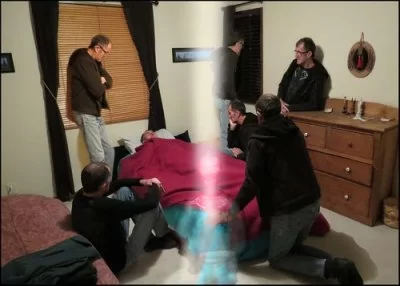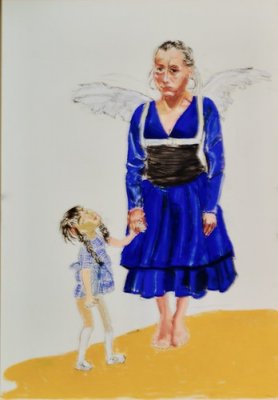Death Anxiety – When a Fear of Dying is Stopping You Living
by Andrea M. Darcy
Is a fear of death secretly consuming your thoughts? Or something that wakes you up at night? You need to learn about ‘death anxiety’.
Is a fear of death normal?
It’s normal to fear the unknown. And, while other cultures celebrate death, such as Mexico’s famous ‘Day of the Dead’, most of Western society doesn’t discuss death much.
This is changing with the popularity of ‘death cafes’ and ‘death doulas’. But in general, most people are uneducated about what death entails, and feel mild anxiety thinking about it.
In some ways this mild anxiety about our mortality, triggered by things like losing a loved one, reading about a tragedy, or a health scare, is useful.
It reminds us to make the most of our lives. To take care of our health, to seek purpose, and to make time for those we love.
When is it ‘death anxiety’?
Are thoughts of death and dying are often nagging at you? Is your lifestyle increasingly dictated by this fear?
Fear of death and dying is at the point you need support if you:
- think about death in a negative way daily
- allow life choices to be dictated by your fear of death
- have sleep problems because you wake up thinking about death
- distance yourself from others when you have death anxiety
- avoid having the children you want in case you die in birth
- don’t do necessary health procedures because of fear of dying.
What is thanatophobia?
Thanatophobia is not an official psychological diagnosis. It is instead a popular term used to refer to a general fear of death and death anxiety.
If thinking of death is causing you serious symptoms, you might instead receive a diagnosis of generalised anxiety disorder (GAD). This would mean your thoughts of death and dying are increasingly illogic and give you symptoms like heart palpitations, sweating, dizziness, stomach pain, and panic attacks. You might also feel agitated, moody, and withdraw from usual social activity.
Other mental health issues connected to a fear of dying

By: Si B
If you already suffer from anxiety and depression, you are more likely to have death anxiety.
Thoughts of death and dying could also be connected to obsessive compulsive disorder. In this case, obsessive thinking about death then causes an ordered, repeated reaction, such as a series of tasks you do to ‘save’ yourself or those you love from death. This could be physical, like hand washing or ordering, or mental compulsions, like a checklist you go through repeatedly.
Is it really death you are afraid of?
Sometimes it’s not actually all things related to dying that is causing you upset. By identifying the actual trigger for your anxiety, you can shrink the cloud you sense hovering behind you, and deal with your phobia.
What part of death is scary for you? Is it one of the below, or a combination? Are you afraid of;
- pain and suffering?
- what lies beyond death?
- worries there is a hell?
- dying young?
- causing people upset and responsibility?
- not having done enough with your life?
- being forgotten?
- your children being without you?
How to feel less afraid of death and dying
A 2018 review of research on fear of death and dying led by King’s College in London identified the following as traits found in people who do not suffer a fear of death. They are all things you can work to have in your life:
- “high self-esteem
- religious beliefs
- good health
- a sense of fulfilment in life
- intimacy with family and friends
- a fighting spirit.”

By: aka Tman
Or try giving yourself credit for what you have been and done.
A famous psychological model by psychologist Erik Erickson dictates eight stages of personal growth in a lifetime. It has, as a final stage, ‘ego integrity versus despair’. The idea is that if we reflect on our life’s ups and downs, what we did and didn’t achieve, and find acceptance, we gain integrity, and can avoid the despair that death can otherwise bring.
Educate yourself about death and dying
If it’s fear of the unknown that gives you death anxiety, there is nothing negative or morbid about educating yourself about death. Approach it as practical research.
- Find a local ‘death cafe’ where people in the community talk frankly about death together.
- Speak with a ‘death doula’, a person certified to help families and individuals navigate the death process.
- Look at the ways different cultures and religions approach death.
- Read about near death experiences.
Or even try a ‘virtual’ out of body experience (OBE). In an interesting if limited small study, a group that was given the sensation of an out of body experience using virtual reality had a lowered fear of death, as opposed to the control group.
Seek support for death anxiety
A counsellor or psychotherapist will be more than happy to discuss your fear of death and dying. If your thanatophobia is actually connected to depression, anxiety, or obsessive compulsive disorder, they will also work with you on these issues.
Types of therapy that can help you with death anxiety
Any type of counsellor or psychotherapist will be happy to talk with you about your anxieties around death, dying, loss and bereavement.
Otherwise, cognitive behavioural therapy (CBT) can help you get control of your thinking and make it more balanced, and is evidence-based to lower anxiety.
Existential therapy can help you find your sense of purpose in life, so you can stop feeling like your life is out of control and you will ‘die without having done anything’.
Transpersonal therapy can help you explore your personal spirituality, and what the world means to you, so you feel more connected and less afraid of ‘what lies beyond’.
Time to seek support around your fear of death and dying? Harley Therapy connects you with London’s top psychotherapists. Or use our booking site to find UK-wide registered therapists as well as online counsellors you can access globally.
 Andrea M. Darcy is a mental health and wellbeing expert, who has done some training in person-centred counselling and coaching. She often writes about trauma, relationships, and ADHD, and advises people on how to plan their therapy journey. Find her on Instagram @am_darcy
Andrea M. Darcy is a mental health and wellbeing expert, who has done some training in person-centred counselling and coaching. She often writes about trauma, relationships, and ADHD, and advises people on how to plan their therapy journey. Find her on Instagram @am_darcy






Yes, I suffer from depression and anxiety but I have always struggled with the concept of death but when younger, occasionally someone died but since my gran and aunt died 10 yrs ago, my death problem has become much worse. I am now 45 and feel a sense of my own mortality due to my energy levels, mental health, physical health and i also have a problem with addiction. The irony being that each time I take a drug, I put myself in danger…death or shortening my life span but yet that’s not enough to shock me out of taking the drug…part I& the increased usage of drugs came about when bereavements happened as a coping mechanism. My mum is now 68 and 8 see her being energetic than she was and slightly more frail. I am only child whose father died when I was 6mths old. I have moments when it just hits the fron5 of my mind that I am going to die, my mum is too and I get intoa panic attack….the finite element…thé not seeing my mum again…I can’t cope without my mum around..not knowing if she is Iin pain and that she is no longer present, no longer feels, what was it all for to have it taken away? I feel guilty for the fact that I don’t constantly remember my gran, aunt and grandfather and uncle, I think that’s totally selfish of me but I have to force the feeling down but maybe it answers part of why my self esteem is low. The lack of control over death is awful….i feel partly as tho when u get to a certain age, you spin a wheel in your dreams which tells you how long u have left and you can pitch a set of reasons why it shud be more and u are heard and that way, you had some control which makes it more reasonable. Just writin*b this is therapeutic to an extent thinking someone else might read it and they might seek comfort in the fact I feel like them and they are not just a freak…nobody else I know feels how I do. Any advice?deano
I do have had a fear of death ever since I can remember I’m 38 now and it seems like the constant thought of my mortality has been here every day constantly my entire life the deepness I feel in life in general I don’t think that many people understand it little kids usually don’t take in the moment because they know that soon this moment’s going to be their last but I did I do this is how it’s been since I was four or five even six I had nothing happen to me that was traumatic in my childhood I had a perfect life actually one you only dream to give your kids a mom and dad that didn’t fight they didn’t argue they gave me everything I wanted and needed they were best friends and partners encouraged and supported they listen to me we had an open and open family nobody really judged put one down it was a perfect childhood I had no trauma no accidents no sexual abuse no abuse. I’m just always known that all we have is this moment and eventually my moment is going to be where I’m taking my last breath and it’s not so much of the not knowing what is after that gets me it’s more of the fear of trying to imagine anything else except who I am in this life that I bonded with. I’ve had seven kids and I’ve lost them all four of them I’ve lost forever being taken by the state and given to strangers I stand My ground for what’s right and I use my voice to try to speak the truth and common knowledge about spreading love and loving one another and accepting one another and I feel like I’ve got dealt the worst cards but yet here I am still alive trying to move on trying to find my next purpose I guess and I still feel so deeply about life I’m not really scared to die I’m just scared to let all this go I guess I’m pretty sure that my fear and death is been what I’ve based every decision around my whole entire life and I feel like it honestly has kept me from living any advice? I did the text or talk to text so if any of this doesn’t make sense and I’m just rambling on I’m sorry
Death anxiety treatment for immortalists and others who are terrified of the illness and transition to probable total annihilation of biological life and consciousness is ineffective. I read on your site about what you do and for people like me it’s ridiculous. Also you’re not an immortalist so you can’t even give anyone hope that through technology, people may continue living. Cellular aging could have a first treatment any day now and accidents are being controlled …for example autonomous vehicles have already proven to bring less deaths than those with human drivers. If mankind continues, death will one day be optional. Who would want this option I cannot understand.